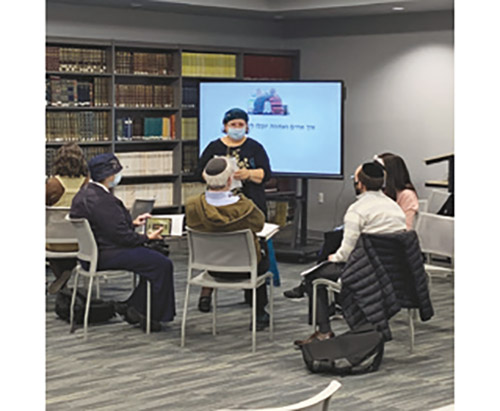



(Courtesy of Ma’ayanot) “Why should what we’re learning matter to me?” Particularly in this generation, across all denominations, students seek meaning in their learning. They want to know how it can connect to their lives, to their natural search for spirituality and their relationship with God. For educators, the question becomes: how do we combine the rigor of text learning with the quest for connection?
Under the direction of Rabbi Dr. Jay Goldmintz, a veteran educator and faculty member at Ma’ayanot, the Jewish Studies faculty last year began to explore the challenges and approaches that could be used to more directly address this need in students. The school was fortunate to be one of only four school awardees in the country sponsored in this work by a grant from the Mayberg Foundation, The Mayberg Foundation grant will be supported by a partnership with Jewish Education Innovation Challenge, a Mayberg Foundation educational initiative, which works to catalyze radical improvement in day schools. A small cadre of teachers were introduced to the work of Lev LaDa’at, an educational organization that has worked with thousands of teachers in Israel on the process of internalizing Torah learning. Students were also polled about their feelings toward their studies and Judaism. The religious guidance staff in the school developed a framework for describing and addressing the unique specific developmental religious needs of students in each grade level, so that everything from lesson plans to shabbatonim to mishmar topics could be better tailored to student needs. The mishmar program, which is attended by more than 250 students weekly after school, introduced a regular self-reflection component, as did many classes.
These efforts were so promising that the Mayberg Foundation awarded the school another grant for this academic year. On November 8 and 9, Rabbi Eli Attia, the director of Lev LaDa’at, and Rabbanit Dr. Chaviva Shpeter, a senior staff member and renowned educator, visited Ma’ayanot in person, observing classes and working intensively with Talmud, Tanach and Halacha faculty. Ma’ayanot teachers had the opportunity to discover and internalize what is called the “lev ha-shiur” just as students would. Suzanne Cohen, chair of Ma’ayanot’s Tanach department, appreciated that Lev LaDa’at “strengthened the idea that we need to find a core message in every unit, so students can see the entire unit in that light.” The sessions also focused on different ways to encourage engagement and internalization in the teaching of limudei kodesh, as an added level to the teaching of content and skills.
This year, Rabbi Goldmintz will be working with the Tanach department while a new faculty member, Rabbi Yehuda Chanales, will bring his extensive experience in helping students cultivate an inner spiritual world to the Talmud department. Rabbi Chanales noted that for the Talmud department, teaching Gemara with a lev ha-shiur “presents unique challenges. The goal is to go beyond the mere relevance of the Talmud, to get at the meaning. When students study a Talmudic dispute, we try to help them see that the different sides reflect underlying values. In Kiddushin, for example, values such as the place of commitment, sanctity and boundaries in a relationship are embedded in the Gemara itself.” Rabbi Chanales is excited to be working with Ma’ayanot’s outstanding faculty. “In Ma’ayanot, I appreciate the faculty’s curiosity and openness to new insights. Their outlook is, ‘Even if it’s not the way I learned, I am willing to implement new methods if that will be helpful to my students.’”
Ma’ayanot students indeed feel a personal connection to Torah. Senior Abby Rosenfeld explained, “A big part of Judaic studies classes at Ma’ayanot is self-reflection. When we’re learning, we have an assignment to go back and ask ourselves, ‘How does this apply to my life; how did I grow from this; what do I learn from this personally?’ and I think that has a large impact on students’ religious and personal growth.” Senior Odelia Sheldo added, “I personally grew tremendously religiously here; I’ve formed such a connection with Hashem.”
Rabbi Goldmintz is passionate about inspiring Ma’ayanot faculty to learn and teach with personalization in mind. He cites Rabbi Soloveitchik to the effect that, “there are two aspects to the religious gesture in Judaism: strict objective discipline and exalted subjective romance. Both are indispensable …. Feelings not manifesting themselves in deeds are volatile and transient; deeds not linked with their inner experience are soulless and ritualistic.” At Ma’ayanot, the goal is to make sure that students can not only learn, but that they can also have a romance with Torah.










